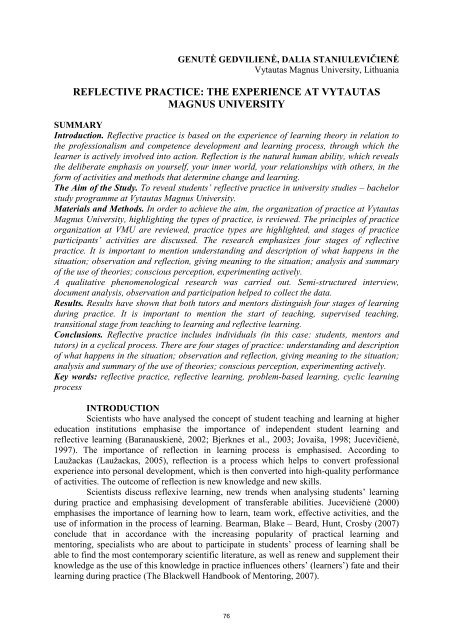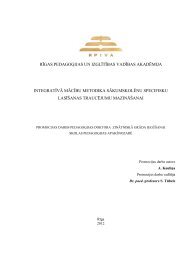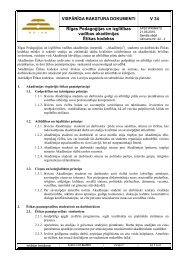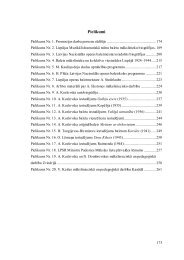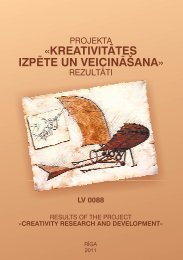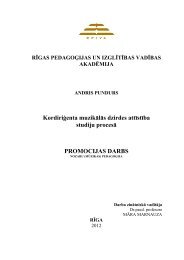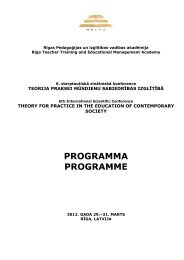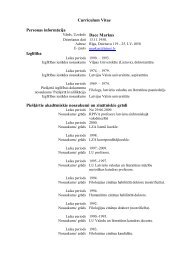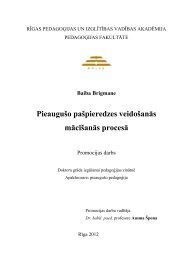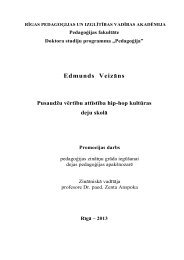saturs - rpiva
saturs - rpiva
saturs - rpiva
- No tags were found...
You also want an ePaper? Increase the reach of your titles
YUMPU automatically turns print PDFs into web optimized ePapers that Google loves.
GENUTĖ GEDVILIENĖ, DALIA STANIULEVIČIENĖ<br />
Vytautas Magnus University, Lithuania<br />
REFLECTIVE PRACTICE: THE EXPERIENCE AT VYTAUTAS<br />
MAGNUS UNIVERSITY<br />
SUMMARY<br />
Introduction. Reflective practice is based on the experience of learning theory in relation to<br />
the professionalism and competence development and learning process, through which the<br />
learner is actively involved into action. Reflection is the natural human ability, which reveals<br />
the deliberate emphasis on yourself, your inner world, your relationships with others, in the<br />
form of activities and methods that determine change and learning.<br />
The Aim of the Study. To reveal students’ reflective practice in university studies – bachelor<br />
study programme at Vytautas Magnus University.<br />
Materials and Methods. In order to achieve the aim, the organization of practice at Vytautas<br />
Magnus University, highlighting the types of practice, is reviewed. The principles of practice<br />
organization at VMU are reviewed, practice types are highlighted, and stages of practice<br />
participants’ activities are discussed. The research emphasizes four stages of reflective<br />
practice. It is important to mention understanding and description of what happens in the<br />
situation; observation and reflection, giving meaning to the situation; analysis and summary<br />
of the use of theories; conscious perception, experimenting actively.<br />
A qualitative phenomenological research was carried out. Semi-structured interview,<br />
document analysis, observation and participation helped to collect the data.<br />
Results. Results have shown that both tutors and mentors distinguish four stages of learning<br />
during practice. It is important to mention the start of teaching, supervised teaching,<br />
transitional stage from teaching to learning and reflective learning.<br />
Conclusions. Reflective practice includes individuals (in this case: students, mentors and<br />
tutors) in a cyclical process. There are four stages of practice: understanding and description<br />
of what happens in the situation; observation and reflection, giving meaning to the situation;<br />
analysis and summary of the use of theories; conscious perception, experimenting actively.<br />
Key words: reflective practice, reflective learning, problem-based learning, cyclic learning<br />
process<br />
INTRODUCTION<br />
Scientists who have analysed the concept of student teaching and learning at higher<br />
education institutions emphasise the importance of independent student learning and<br />
reflective learning (Baranauskienė, 2002; Bjerknes et al., 2003; Jovaiša, 1998; Jucevičienė,<br />
1997). The importance of reflection in learning process is emphasised. According to<br />
Laužackas (Laužackas, 2005), reflection is a process which helps to convert professional<br />
experience into personal development, which is then converted into high-quality performance<br />
of activities. The outcome of reflection is new knowledge and new skills.<br />
Scientists discuss reflexive learning, new trends when analysing students’ learning<br />
during practice and emphasising development of transferable abilities. Jucevičienė (2000)<br />
emphasises the importance of learning how to learn, team work, effective activities, and the<br />
use of information in the process of learning. Bearman, Blake – Beard, Hunt, Crosby (2007)<br />
conclude that in accordance with the increasing popularity of practical learning and<br />
mentoring, specialists who are about to participate in students’ process of learning shall be<br />
able to find the most contemporary scientific literature, as well as renew and supplement their<br />
knowledge as the use of this knowledge in practice influences others’ (learners’) fate and their<br />
learning during practice (The Blackwell Handbook of Mentoring, 2007).<br />
76


